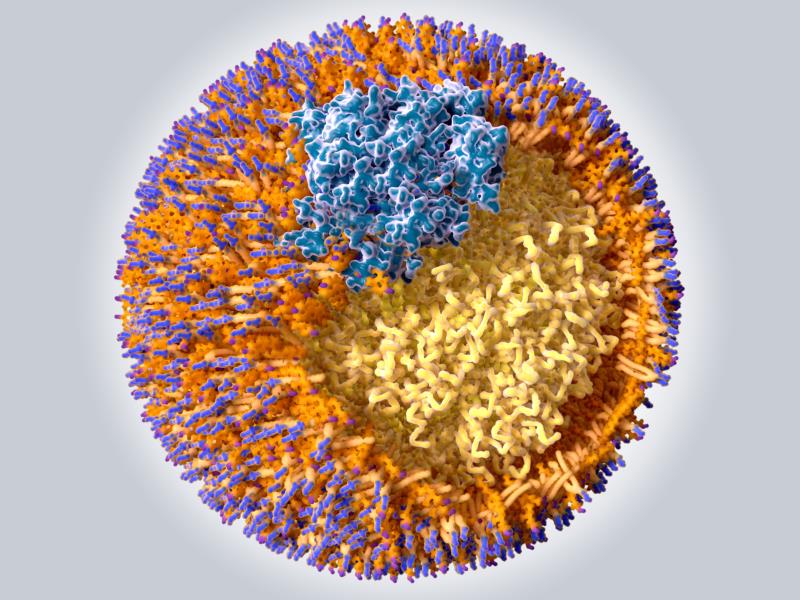
Treatment with inclisiran led to a significantly reduced low-density lipoprotein (LDL) cholesterol levels in patients with atherosclerotic cardiovascular disease (ASCVD), according to two phase III randomized clinical trials.
The ORION-10* and ORION-11** cohorts consisted of 1,561 and 1,617 patients aged 65–66 years (mean LDL, 104.7 and 105.5 mg/dL, respectively) with ASCVD or ASCVD risk equivalent who had elevated LDL cholesterol levels and were previously treated with statin at a maximum tolerated dose. Participants were randomized in a 1:1 ratio to receive either four subcutaneous injections of inclisiran 284 mg or placebo on day 1 and 90, and subsequently every 6 months for a 540-day treatment period. [N Engl J Med 2020;doi:10.1056/NEJMoa1912387]
Inclisiran-treated patients had significantly reduced LDL cholesterol levels compared with the placebo-treated patients at day 510 in ORION-10 (absolute change, -56.2 vs -2.1 mg/dL; between-group difference, -52.3 percent; p<0.00) and ORION-11 trials (absolute change, -50.9 vs 1.0 mg/dL; between-group difference, -49.9 percent; p<0.001).
Both trials also demonstrated significantly lower time-adjusted change in LDL cholesterol levels in patients who received inclisiran vs placebo at day 90 and until day 540 (absolute change, -53.7 vs -0.4 mg/dL; between-group difference, -53.8 percent; p<0.001 in ORION-10 and absolute change, -48.6 vs 0.3 mg/dL; between-group difference, -49.9 percent; p<0.001 in ORION-11).
Among all the participants, PCSK9*** levels decreased by 69.8 percent and 63.5 percent (p<0.001 for both) in the inclisiran arm, whereas increased PCSK9 levels were observed in the placebo arm at 13.5 percent and 15.6 percent (p<0.001 for both) in the ORION-10 and ORION-11 trials, respectively. “Inclisiran, a small interfering RNA (siRNA) therapeutic agent, reduces hepatic synthesis of PCSK9,” the researchers said.
In a prespecified exploratory analysis, the cardiovascular composite outcome occurred at a lower rate of 7.4 percent and 7.8 percent in the inclisiran arm compared with 10.2 percent and 10.3 percent in the placebo arm for both ORION-10 and ORION-11 trials, respectively.
The incidence of adverse events (AEs) were comparable between the inclisiran and placebo arms (73.5 percent vs 74.8 percent [in ORION-10] and 82.7 percent vs 81.5 percent [in ORION-11]).
However, injection-site AEs occurred more frequently in the inclisiran arm than the placebo arm for both trials (2.6 percent vs 0.9 percent [in ORION-10] and 4.7 percent vs 0.5 percent [in ORION-11]), which were mostly mild or moderate in severity. “[Of note, even] without further injections, the LDL cholesterol-lowering effects of inclisiran are reversed at the rate of approximately 2 percent per month, which means that these effects can persist for up to approximately 2 years,” the researchers noted.
Although more injection-site AEs were reported in the inclisiran group, “we found that a regimen of inclisiran every 6 months was feasible and significantly reduced LDL cholesterol levels by approximately 50 percent,” said the researchers, noting that “sustained reductions in LDL cholesterol levels are achievable [even] with an infrequent dosing schedule of inclisiran.”
“[Furthermore,] the results of our trials have the potential to move RNAi-based therapies from the realm of rare to common diseases,” they added.
*ORION-10: Inclisiran for participants with atherosclerotic cardiovascular disease and elevated low-density lipoprotein cholesterol
**ORION-11: Inclisiran for subjects with ACSVD or ACSVD-risk equivalents and elevated low-density lipoprotein cholesterol
***PCSK9: Proprotein convertase subtilisin-kexin type 9